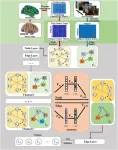(Press-News.org) The early treatment of obesity in children is effective in both the short and long term, researchers from Karolinska Institutet report in a study published in The International Journal of Obesity.
The researchers followed over 170 young children in Sweden who had received treatment for diagnosed obesity. The children were recruited to the randomised controlled study when they were between four and six years old via children’s clinics in Region Stockholm.
The children and their parents were randomly assigned to one of three treatment conditions: standard treatment, parental support group, or parental support group with follow-up telephone support.
The children and parents in the standard treatment group had meetings focusing on diet and exercise with a doctor, paediatrician and/or dietician. The two parental support groups did not involve the children and focused on how the parents could promote healthy lifestyles in the family in a positive way and without conflict.
“Such conversations can centre on how to set boundaries, how to teach children new behaviours and how to communicate with preschools, grandmothers, neighbours and other adults in the children’s world,” says principal investigator Paulina Nowicka, Associate Professor in Pediatric Science at the Department of Clinical Science, Intervention and Technology, Karolinska Institutet, and professor of Food studies, nutrition and dietetics at Uppsala University.
After attending the parental support groups, half of the participants were then randomly assigned a follow-up phone call.
Studies have been done on children who have been treated for obesity before,” says Professor Nowicka. “But most of them have only been followed up after six months or a year, so we have no data on how the children fared over a longer period than that.”
The study that she and her colleagues have now published suggest that early obesity treatment has a lasting effect.
“The children in all three groups improved their weight status and saw a reduction in their degree of obesity,” she says. “The children whose parents received parental support had the best results, especially so those who also received follow-up phone calls. We also found that more children in this third group showed a clinically relevant improvement of their weight status associated with better metabolic health, by which I mean better levels of blood lipids and glucose.”
According to Professor Nowicka, most parents know what kind of food they are to serve their children:
“They usually know this – but what do you do with a child who loves food and always wants to eat, or one that’s always hungry? How do you go about it without making a taboo of food?” she says. “You have to try to build a clear structure at home, one that makes the child know that lunch is on its way and know that they’ll be getting supper.”
She continues: “But you also need to do things together to strengthen family bonds, like getting the child involved in the cooking, giving the child vegetables if they’re hungry and not rewarding them with food. It’s also important to make sure that food isn’t associated with emotions and achievement.”
While obesity is difficult to treat, she explains, the study shows that intensive treatment is safe and efficacious for pre-school children:
“Treating children at that age is much more effective than if you start treating them in their teens,” she says. “Some adolescents are looking at possible bariatric surgery and we hope that this can be avoided with earlier treatment.”
The study was a collaboration among researchers at Karolinska Institutet, Uppsala University, Warwick Medical School and Oxford University. It was financed by the Centrum for Innovative Medicine (CIMED) and the Masonic Home for Children in Stockholm Foundation. There are no reported conflicts of interest.
Publication: “A long-term follow-up of treatment for young children with obesity: a randomized controlled trial”, Anna Ek, Markus Brissman, Karin Nordin, Karin Eli and Paulina Nowicka, International Journal of Obesity, online 18 September 2023.
END
Early treatment of child obesity is effective
2023-09-18
ELSE PRESS RELEASES FROM THIS DATE:
Study finds significant chemical exposures in women with cancer
2023-09-18
In a sign that exposure to certain endocrine-disrupting chemicals may be playing a role in cancers of the breast, ovary, skin and uterus, researchers have found that people who developed those cancers have significantly higher levels of these chemicals in their bodies.
While it does not prove that exposure to chemicals like PFAS (per- and poly-fluoroalkyl substances) and phenols (including BPA) led to these cancer diagnoses, it is a strong signal that they may be playing a role and should be studied further.
The study showed that particularly for women, higher ...
Societal collapse is underway and museums can be unlikely heroes, suggests expert
2023-09-18
Museums and Societal Collapse: The Museum as Lifeboat presents evidence and theories around collapse and extinction, while locating the responsibility of museums in our changing world
Stressors like climate trauma, corporate deceit and political incompetence signal the threat of societal collapse, a new book asserts.
This claim lays the foundation for exploring arguments of ‘collapsology’ in new work by Robert R. Janes Ph.D., Museums and Societal Collapse: The Museum as Lifeboat. The book also contends with the unique role that can be played by museums during a mounting climate crisis.
“Social ...
Transfer of ageing: New drug class prevents key ageing mechanism in organ transplants
2023-09-18
(18 September 2023, Athens, Greece) A novel study has shown that Senolytics, a new class of drugs, have the potential to prevent the transfer of senescence*, a key mechanism of ageing, and the associated physical and cognitive impairments in recipients of older donor organs. 1
The pioneering research, presented today at the European Society for Organ Transplantation (ESOT) Congress 2023, opens promising avenues for expanding the organ donor pool and enhancing patient outcomes.
By transplanting older donor organs into younger ...
Ultrasound scans by doctors in emergency departments to diagnose deep vein thrombosis halve patients’ stay and may help to reduce over-crowding
2023-09-18
Barcelona, Spain: If doctors in hospital emergency departments are trained to carry out ultrasound on patients with suspected deep vein thrombosis (DVT), they can nearly halve the time the patients spend in these departments.
Dr Ossi Hannula, an emergency medicine specialist at the Wellbeing Services County of Central Finland, Jyväskylä, Finland, who presented the findings at the European Emergency Medicine Congress today (Monday), said his findings could help to reduce overcrowding in emergency departments ...
Brain-altering parasite turns ants into zombies at dawn and dusk
2023-09-17
Imagine coming-to, jaws gripping the top of a swaying blade of grass, unaware of how you got there. That's the reality for ants infected with the lancet liver fluke, a tiny parasitic flatworm. Liver flukes have a complicated, almost insanely conceived life cycle, which begins with the hijacking of the ant’s brain. The unsuspecting ant climbs up and clamps its powerful jaws onto the top of a blade of grass, making it more likely to be eaten by grazers such as cattle and deer.
Researchers from the University of Copenhagen’s Department of Plant ...
Neonatal kidney transplantation offers new hope in the organ shortage crisis, study shows
2023-09-17
(17 September 2023, Athens, Greece) New research, presented today at the European Society for Organ Transplantation (ESOT) Congress 2023, demonstrates that neonatal* kidney transplantation can offer a ‘game-changing’ solution to the pressing organ shortage crisis. 1
To assess the feasibility of neonatal organ donation, researchers analysed neonatal mortality in the United States and the long-term development of these kidneys after transplantation as well as the ethical and social considerations surrounding the procedure. 1
The study revealed that out of the 21,000 infants who lost their lives ...
Islet transplantation boosts long-term survival in kidney transplant recipients with type 1 diabetes
2023-09-17
(17 September 2023, Athens, Greece) Islet transplantation significantly reduces the risk of transplantation failure and enhances life expectancy in individuals with type 1 diabetes who undergo kidney transplantation, a new study has revealed. 1
This breakthrough research, presented today at the European Society for Organ Transplantation (ESOT) Congress 2023, compared the long-term outcomes of patients with type 1 diabetes who underwent kidney transplantation and received an islet transplantation*, with patients who underwent kidney transplantation and then managed their diabetes with insulin ...
Breakthrough model utilizes movie-watching FMRI and eye-tracking to predict cognitive scores
2023-09-16
In a recent article published in Volume 3 of the journal Psychoradiology, researchers from Northwestern Polytechnical University have unveiled the groundbreaking "Attention-CensNet" (A-CensNet), a fusion model that predicts cognitive scores by amalgamating movie-watching functional magnetic resonance imaging (mfMRI) and eye-tracking data. In this model, participants serve as nodes, mfMRI data are translated into node features, and eye-tracking details forge the connections between participants, creating graph edges. By employing ...
New perspectives on MAFLD
2023-09-16
Fatty liver disease is a condition characterised by a build-up of fat in the liver and is the most common chronic liver disease that affects over one billion people. Over time, this can lead to complications including cirrhosis, liver failure, liver cancer, and heart health issues. The disease is now known as metabolic (dysfunction) associated fatty liver disease (MAFLD). This is because the disease is now understood to be linked to metabolic factors, such as obesity, insulin resistance, and diabetes.
MAFLD is a multisystem disorder with a heterogeneous disease course and outcomes. This means that it can affect multiple organs, and the course of the disease can vary from person ...
Brain inspires more robust AI
2023-09-16
Most artificially intelligent systems are based on neural networks, algorithms inspired by biological neurons found in the brain. These networks can consist of multiple layers, with inputs coming in one side and outputs going out of the other. The outputs can be used to make automatic decisions, for example, in driverless cars. Attacks to mislead a neural network can involve exploiting vulnerabilities in the input layers, but typically only the initial input layer is considered when engineering a defense. For the first time, researchers augmented a neural network’s inner layers with a process involving random noise to improve its resilience.
Artificial intelligence (AI) ...



